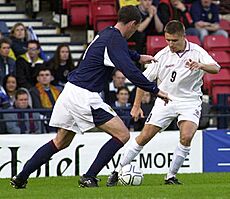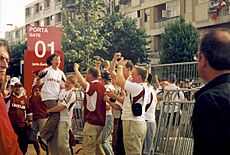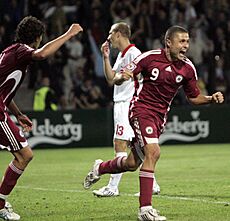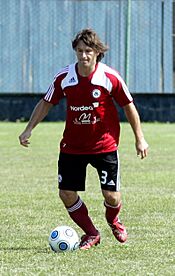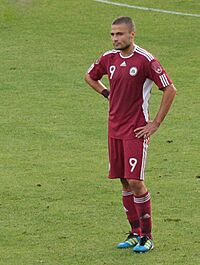Latvia national football team facts for kids
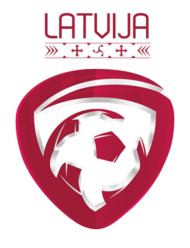 |
|||
| Nickname(s) | 11 vilki (11 Wolves) |
||
|---|---|---|---|
| Association | Latvijas Futbola federācija (LFF) | ||
| Confederation | UEFA | ||
| Head coach | Paolo Nicolato | ||
| Captain | Kristers Tobers | ||
| Most caps | Vitālijs Astafjevs (167) | ||
| Top scorer | Māris Verpakovskis (29) | ||
| Home stadium | Skonto Stadium Daugava Stadium (rare matches) |
||
| FIFA code | LVA | ||
|
|||
| FIFA ranking | |||
| Current | 131 |
||
| Highest | 45 (November 2009) | ||
| Lowest | 148 (September 2017) | ||
| Elo ranking | |||
| Current | 138 |
||
| Highest | 45 (25 September 1938) | ||
| Lowest | 155 (October 2019) | ||
| First international | |||
(Riga, Latvia; 24 September 1922) |
|||
| Biggest win | |||
(Tallinn, Estonia; 18 August 1942) |
|||
| Biggest defeat | |||
(Stockholm, Sweden; 29 May 1927) |
|||
| European Championship | |||
| Appearances | 1 (first in 2004) | ||
| Best result | Group stage (2004) | ||
| Baltic Cup | |||
| Appearances | 29 (first in 1928) | ||
| Best result | Champions (1928, 1932, 1936, 1937, 1993, 1995, 2001, 2003, 2008, 2012, 2014, 2016, 2018) | ||
The Latvia national football team (in Latvian: Latvijas futbola izlase) represents the country of Latvia in men's international football. The team is nicknamed 11 vilki, which means the "11 Wolves." It is managed by the Latvian Football Federation.
The team has never played in the FIFA World Cup. However, they achieved their greatest success in 2004. Under coach Aleksandrs Starkovs, they qualified for the European Championship for the first time.
Latvia also competes in the Baltic Cup, a tournament against their neighbors Lithuania and Estonia. They are the most successful team in the cup's history, having won it 13 times. The team plays most of its home games at the Skonto Stadium in Riga.
History
The Early Years (1922–1940)
The Latvia national team played its first-ever game on September 24, 1922. The match was against Estonia and ended in a 1–1 draw. In 1924, the team even competed in the Summer Olympics in Paris.
During the 1920s and 1930s, Latvia became a strong team in its region. They won the first Baltic Cup in 1928. In 1937, they came very close to qualifying for the 1938 FIFA World Cup. They beat Lithuania twice but lost a key game against Austria.
The team's activities stopped in 1940. For many years, Latvia was part of the Soviet Union, and the national team did not play as an independent country.
Return to Football and Euro 2004 Glory
Latvia became an independent country again in 1991. The national football team was re-formed and played its first match after 52 years in 1992. The team had to be built from scratch, but they quickly became competitive.
The team's greatest moment came during the qualification for UEFA Euro 2004. Coached by Aleksandrs Starkovs, Latvia finished second in their group. This earned them a play-off match against Turkey, who had finished third in the 2002 World Cup.
In the first game in Riga, star striker Māris Verpakovskis scored the only goal in a 1–0 win. In the second game in Istanbul, Turkey was leading 2–0. But Latvia fought back with goals from Juris Laizāns and Verpakovskis to draw 2–2. Latvia won 3–2 overall and qualified for Euro 2004, a huge achievement for the country.
Performance at UEFA Euro 2004
At the tournament in Portugal, Latvia was in a very tough group with the Czech Republic, Germany, and the Netherlands.
In their first match, they lost 2–1 to the Czech Republic, but Verpakovskis scored Latvia's first-ever goal in a major tournament. Their most famous result came in the second game, where they held Germany to a 0–0 draw. This was a historic moment and earned them their first point. They lost their final game 3–0 to the Netherlands and did not advance, but their performance was celebrated back home.
Later Years (2005–Present)
After the success of 2004, Latvia has had ups and downs. The team has not qualified for another major tournament since. However, they have continued to be successful in the Baltic Cup, winning it many more times.
The team went through several coaches after Aleksandrs Starkovs left. They came close to qualifying for the 2010 FIFA World Cup, finishing third in their group. In recent years, the team has focused on bringing in younger players to build for the future.
In 2022, Latvia won its group in the UEFA Nations League D, earning a promotion to League C. This was a positive step for the team. As of 2024, the team is coached by Paolo Nicolato from Italy.
Team Image
Kits and Crest
Latvia's traditional home kit is a carmine red shirt, red shorts, and red socks. The away kit is usually all white.
In 2018, the team got a new crest. It is a shield with a football designed with the colors of the Latvian flag. It also has the word 'LATVIJA' (Latvia) written at the top. There is also a secondary logo of a howling wolf, which connects to the team's nickname, the "11 Wolves."
Kit suppliers
| Kit supplier | Period |
|---|---|
| 1992-1994 | |
| 1994-1996 | |
| 1996–1998 | |
| 1998–2000 | |
| 2000–2002 | |
| 2002–present |
Stadium
The Latvian national team plays its home games in Riga, the capital city. For many years, they have played at two main stadiums: the Skonto Stadium and the Daugava Stadium.
The Daugava Stadium was the team's main home until 2000. After that, most games were moved to the Skonto Stadium. The Daugava Stadium was renovated and the team returned there in 2018. However, recently, the team has been playing at Skonto Stadium again. It is now considered the main home for the men's team.
Players
Current squad
The following players were called up for the 2026 FIFA World Cup qualification matches in June 2025.
Caps and goals are correct as of 10 June 2025.
| No. | Pos. | Player | Date of birth (age) | Caps | Goals | Club |
|---|---|---|---|---|---|---|
| 1 | GK | Krišjānis Zviedris | 21 January 1997 | 4 | 0 | |
| 12 | GK | Frenks Dāvids Orols | 26 June 2000 | 0 | 0 | |
| 23 | GK | Rihards Matrevics | 18 March 1999 | 13 | 0 | |
|
|
||||||
| 2 | DF | Daniels Balodis | 10 June 1998 | 20 | 1 | |
| 3 | DF | Vitālijs Jagodinskis | 28 February 1992 | 37 | 0 | |
| 5 | DF | Antonijs Černomordijs | 26 September 1996 | 42 | 3 | |
| 13 | DF | Raivis Andris Jurkovskis | 9 December 1996 | 53 | 0 | |
| 14 | DF | Andrejs Cigaņiks | 12 April 1997 | 64 | 4 | |
| 20 | DF | Maksims Toņiševs | 12 May 2000 | 6 | 0 | |
| 21 | DF | Deniss Meļņiks | 7 September 2002 | 6 | 0 | |
| DF | Vjačeslavs Isajevs | 23 August 1993 | 7 | 0 | ||
|
|
||||||
| 4 | MF | Kristaps Grabovskis | 14 June 2005 | 0 | 0 | |
| 6 | MF | Kristers Penkevics | 28 January 2003 | 1 | 0 | |
| 7 | MF | Eduards Dašķevičs | 12 July 2002 | 20 | 0 | |
| 8 | MF | Renārs Varslavāns | 23 August 2001 | 17 | 1 | |
| 11 | MF | Gļebs Žaleiko | 27 June 2004 | 1 | 0 | |
| 15 | MF | Dmitrijs Zelenkovs | 15 May 2000 | 17 | 0 | |
| 16 | MF | Alvis Jaunzems | 16 June 1999 | 46 | 0 | |
| 17 | MF | Lukass Vapne | 31 August 2003 | 11 | 0 | |
| 22 | MF | Aleksejs Saveļjevs | 30 January 1999 | 30 | 1 | |
| MF | Kristers TobersINJ | 13 December 2000 | 37 | 1 | ||
|
|
||||||
| 9 | FW | Vladislavs Gutkovskis | 2 April 1995 | 54 | 11 | |
| 10 | FW | Jānis Ikaunieks | 16 February 1995 | 68 | 12 | |
| 18 | FW | Marko Regža | 20 January 1999 | 12 | 0 | |
| 19 | FW | Bruno Melnis | 21 January 2004 | 1 | 0 | |
Player Records
Here are some of the record-holding players for the Latvian national team.
- Players in bold are still playing for Latvia.
Most Appearances
| Rank | Player | Caps | Goals | Period |
|---|---|---|---|---|
| 1 | Vitālijs Astafjevs | 167 | 16 | 1992–2010 |
| 2 | Andrejs Rubins | 117 | 9 | 1998–2011 |
| 3 | Juris Laizāns | 113 | 15 | 1998–2013 |
| 4 | Imants Bleidelis | 106 | 10 | 1995–2007 |
| 5 | Mihails Zemļinskis | 105 | 12 | 1992–2005 |
| 6 | Māris Verpakovskis | 104 | 29 | 1999–2014 |
| 7 | Igors Stepanovs | 100 | 4 | 1995–2011 |
| Andris Vaņins | 100 | 0 | 2000–2019 | |
| 9 | Aleksandrs Koliņko | 94 | 0 | 1997–2015 |
| 10 | Kaspars Gorkšs | 89 | 5 | 2005–2017 |
Top Goalscorers
| Rank | Player | Goals | Caps | Average | Period |
|---|---|---|---|---|---|
| 1. | Māris Verpakovskis | 29 | 104 | 0.28 | 1999–2014 |
| 2. | Ēriks Pētersons | 24 | 63 | 0.38 | 1929–1939 |
| 3. | Vitālijs Astafjevs | 16 | 167 | 0.1 | 1992–2010 |
| 4. | Marians Pahars | 15 | 75 | 0.2 | 1996–2007 |
| Juris Laizāns | 15 | 113 | 0.13 | 1998–2013 | |
| 6. | Alberts Šeibelis | 14 | 54 | 0.26 | 1925–1939 |
| 7. | Iļja Vestermans | 13 | 23 | 0.57 | 1935–1938 |
| Valērijs Šabala | 13 | 53 | 0.25 | 2013–2019 | |
| 9. | Aleksandrs Cauņa | 12 | 45 | 0.27 | 2007–2015 |
| Jānis Ikaunieks | 12 | 65 | 0.18 | 2014–present | |
| Mihails Zemļinskis | 12 | 105 | 0.11 | 1992–2005 |
Competitive Record
FIFA World Cup
Latvia has never qualified for the FIFA World Cup.
| FIFA World Cup record | Qualification record | ||||||||||||||
|---|---|---|---|---|---|---|---|---|---|---|---|---|---|---|---|
| Year | Result | Position | Pld | W | D* | L | GF | GA | Pld | W | D | L | GF | GA | |
| Did not enter | Declined invitation | ||||||||||||||
| Did not enter | |||||||||||||||
| Did not qualify | 3 | 2 | 0 | 1 | 10 | 5 | |||||||||
| Part of the |
Part of the |
||||||||||||||
| Did not qualify | 12 | 0 | 5 | 7 | 4 | 21 | |||||||||
| 10 | 3 | 1 | 6 | 10 | 14 | ||||||||||
| 8 | 1 | 1 | 6 | 5 | 16 | ||||||||||
| 12 | 4 | 3 | 5 | 18 | 21 | ||||||||||
| 10 | 5 | 2 | 3 | 18 | 15 | ||||||||||
| 10 | 2 | 2 | 6 | 10 | 20 | ||||||||||
| 10 | 2 | 1 | 7 | 7 | 18 | ||||||||||
| 10 | 2 | 3 | 5 | 11 | 14 | ||||||||||
| Qualification in progress | 3 | 1 | 1 | 1 | 2 | 4 | |||||||||
| To be determined | To be determined | ||||||||||||||
| Total | 0/11 | 88 | 22 | 19 | 47 | 95 | 148 | ||||||||
UEFA European Championship
Latvia has qualified for the European Championship one time, in 2004.
| UEFA European Championship record | Qualifying record | |||||||||||||||
|---|---|---|---|---|---|---|---|---|---|---|---|---|---|---|---|---|
| Year | Result | Position | Pld | W | D* | L | GF | GA | Squad | Pld | W | D | L | GF | GA | |
| Part of the |
Part of the |
|||||||||||||||
| Did not qualify | 10 | 4 | 0 | 6 | 11 | 20 | ||||||||||
| 10 | 3 | 4 | 3 | 13 | 12 | |||||||||||
| Group stage | 14th | 3 | 0 | 1 | 2 | 1 | 5 | Squad | 10 | 6 | 2 | 2 | 13 | 8 | ||
| Did not qualify | 12 | 4 | 0 | 8 | 15 | 17 | ||||||||||
| 10 | 3 | 2 | 5 | 9 | 12 | |||||||||||
| 10 | 0 | 5 | 5 | 6 | 19 | |||||||||||
| 10 | 1 | 0 | 9 | 3 | 28 | |||||||||||
| 8 | 1 | 0 | 7 | 5 | 19 | |||||||||||
| To be determined | To be determined | |||||||||||||||
| Total | Group stage | 1/8 | 3 | 0 | 1 | 2 | 1 | 5 | — | 80 | 22 | 13 | 45 | 75 | 135 | |
Honours
- Baltic Cup
- Champions (13 times): 1928, 1932, 1936, 1937, 1993, 1995, 2001, 2003, 2008, 2012, 2014, 2016, 2018
See also
 In Spanish: Selección de fútbol de Letonia para niños
In Spanish: Selección de fútbol de Letonia para niños
- Latvia men's national under-21 football team
- Latvia men's national under-19 football team
- Latvia men's national under-17 football team
- Latvia women's national football team
- Latvia women's national under-17 football team
 | Aurelia Browder |
 | Nannie Helen Burroughs |
 | Michelle Alexander |


